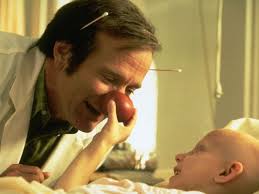 When news broke last week that comic actor Robin Williams had taken his own life, a variety of news outlets reached out to ask us to ask about the subject of troubled comedians. There are no easy answers, we told them. Every tragedy is a personal tragedy. There is no way to simplify someone’s life choices into a simple trend, statistic, or scientific theory.
When news broke last week that comic actor Robin Williams had taken his own life, a variety of news outlets reached out to ask us to ask about the subject of troubled comedians. There are no easy answers, we told them. Every tragedy is a personal tragedy. There is no way to simplify someone’s life choices into a simple trend, statistic, or scientific theory.
The best we can do is point out that the idea of the tragic comedian is nothing new. As we noted in a Slate article on the subject,
The notion that comedians are unhinged can be traced back to the beginnings of the art form. Some historians believe Charley Case, an African-American vaudeville performer, gave birth to stand-up when, in the 1880s or ’90s, he starting performing comic monologues without props or costuming, something that hadn’t been done before. While Case enjoyed relative success at the time, he lived a troubled life. He suffered a nervous breakdown and died in 1916 at the Palace Hotel on 45th Street in New York “while cleaning his revolver,” as reports later put it.
But despite its longevity, the stereotype that comedians are inherently disturbed could be just that – a stereotype. As we noted in the same article,
Gil Greengross, an anthropologist from the University of New Mexico, has… found that comedians on the whole don’t report having more childhood problems than is typical among university students, nor do they appear to be more neurotic. He did find that they tend to be slightly more introverted and disagreeable than others, an odd finding considering that they’re always making jokes in front of crowds. But as Greengross notes, “The personalities they project on stage might not be their personalities in daily life.”
So then why do so many people assume successful comics are troubled? Maybe the problem isn’t with the comics, it’s with the act of creating comedy. You can read about Pete’s experiments trying to prove this in the Slate article.
The news of Robin Williams’ death also made us think back to the time we spent clowning in the Amazon with the real-life inspiration for one of Williams’ most recognized roles: the clown doctor Patch Adams. As we note in our book, Adams had a complicated relationship with Williams. While the blockbuster movie made the innovative doctor famous, it didn’t bring him the funding and support he needed to build his dream hospital. (Adams’ good friend, Carl Hammerschlag, elaborates on some of these issues in a recent video diary.) Still, that didn’t stop one celebrated jester from appreciating the work of another. As Adams, while back in the jungle for his annual trip to the Amazon, noted in a Time magazine essay last week,
Robin Williams was a wonderful, kind and generous man. One important thing I remember about his personality is that he was unassuming—he never acted as if he was powerful or famous. Instead, he was always tender and welcoming, willing to help others with a smile or a joke. Robin was a brilliant comedian—there is no doubt. He was a compassionate, caring human being. While watching him work on the set of the film based on my life—Patch Adams–I saw that whenever there was a stressful moment, Robin would tap into his improvisation style to lighten the mood of cast and crew. Also, I would like to point out, Robin would be especially kind toward my children when they would visit the set.
You can read Adams’ entire piece here.

